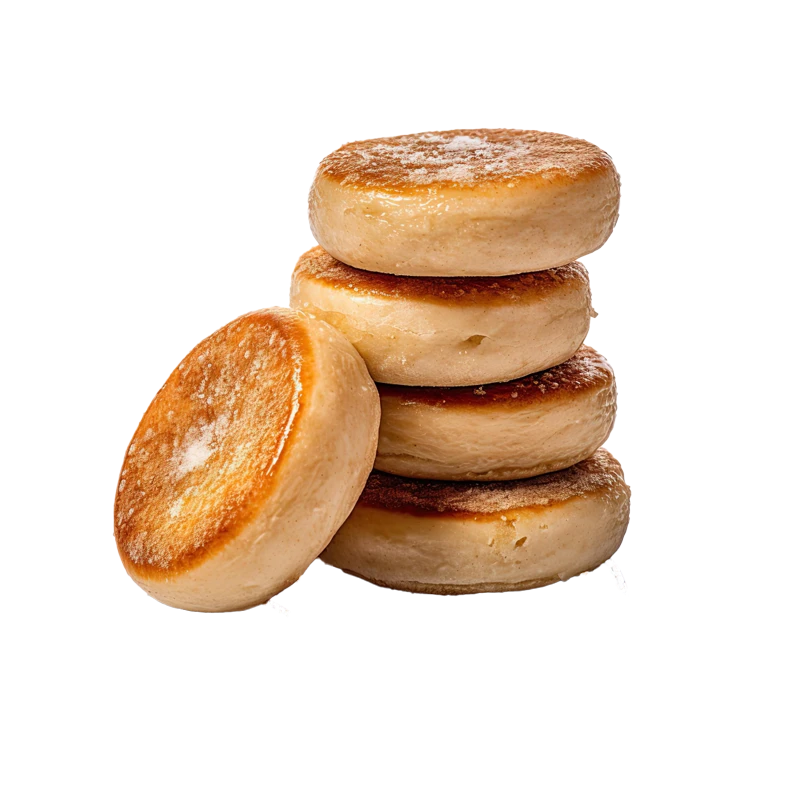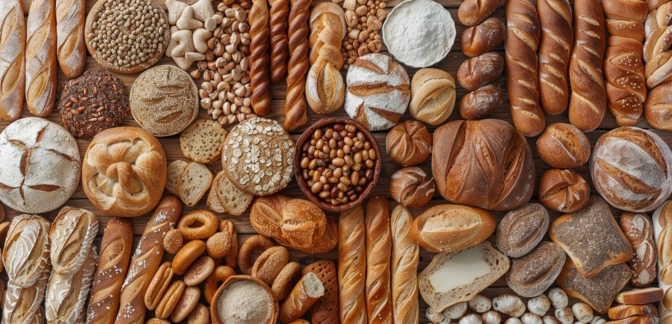English Muffins — Nutrients, Health Benefits, And Shopping Tips

Written by Listonic Team
Last update on September 4, 2024
English muffins nutrients
Nutrition facts
Amount per 100 g
Calories
🔥 227 kcal
| Nutrition per: 100 g | Value | % Daily Value* |
|---|---|---|
| Carbs | 44 g | 16% |
| Fiber | 2 g | 7.14% |
| Sugars | 2 g | 4% |
| Glycemic Index | 70 | - |
| Protein | 8 g | 16% |
| Sodium | 422 mg | 18.35% |
| Total Fat | 1 g | 1.28% |
*The % of Daily Value (DV) tells you how much a nutrient in a serving of food contributes to a daily diet. 2,000 calories a day is used for general nutrition advice.
1 g
🥕 Low Fat Content
2 g
🍏 Low Sugar Content
English muffins facts & tips
Health benefits
- Provides sustained energy from complex carbohydrates, making them a good source of fuel for the body and brain.
- Can be high in fiber if made from whole grains, supporting digestive health and promoting regular bowel movements.
- Contains essential vitamins and minerals such as B vitamins and iron, which support overall health and well-being.
- Versatile and easy to prepare, making them a convenient option for breakfast or snacks.
Health risks
- High carbohydrate content which can cause rapid spikes in blood sugar levels, particularly concerning for diabetics when consumed in large quantities.
- Low nutrient density as English muffins made from refined flour offer limited vitamins or minerals compared to whole grain options.
- Potential for gluten content making them unsuitable for individuals with celiac disease or gluten sensitivity, potentially causing digestive discomfort and other health issues.
- High sodium content in some commercial English muffins, which can contribute to hypertension and increased cardiovascular risks.
How to choose english muffins
English muffins should be light and airy with a slightly crisp exterior when toasted. They should have nooks and crannies that are well-defined, perfect for holding onto melted butter or jam.
Avoid English muffins that are hard or have a uniform texture, as these may be stale. Packages that are open or damaged should also be avoided, compromising freshness and potentially allowing mold growth.

How to store english muffins
English muffins should be stored at room temperature in an airtight container. Proper storage keeps them soft and fresh for up to a week. For longer storage, freezing is recommended.
Air exposure can cause English muffins to become stale. Avoid leaving them uncovered, and always reseal the packaging tightly. Toasting them before serving can help restore their texture.
✅ Extra Tip
How long do they last?
English muffins can last for 3-5 days at room temperature when stored in an airtight container. For longer storage, English muffins can be frozen for up to 3 months. Proper storage helps maintain their softness and flavor.
What to do with leftovers?
Leftover English muffins can be used in a variety of sweet and savory dishes. Toast them and serve with butter, jam, or honey for a quick breakfast, or use them as a base for mini pizzas with tomato sauce, cheese, and your favorite toppings. English muffins are also great when used to make eggs Benedict with poached eggs, ham, and hollandaise sauce.
Use English muffins in a breakfast sandwich with eggs, cheese, and bacon, or mix them into a bread pudding by tearing them into pieces and mixing with eggs, milk, and spices, then baking until set. If you have a lot of English muffins, consider making a batch of English muffin croutons by cubing, tossing with olive oil and seasonings, and baking until crispy. English muffins can also be used as a base for open-faced sandwiches with deli meats, cheese, and vegetables, or blended into breadcrumbs for coating meats or vegetables. For a quick snack, enjoy English muffins with peanut butter, cream cheese, or Nutella, or serve them with a side of soup or salad.
👨⚕️️ Medical disclaimer
Discover products from other categories
Listonic Team
Fact-checked
Our editorial team checked this article to make sure it was accurate at the time of publishing it.
Get the top-rated shopping list app

english muffins
1 piece
Outline







